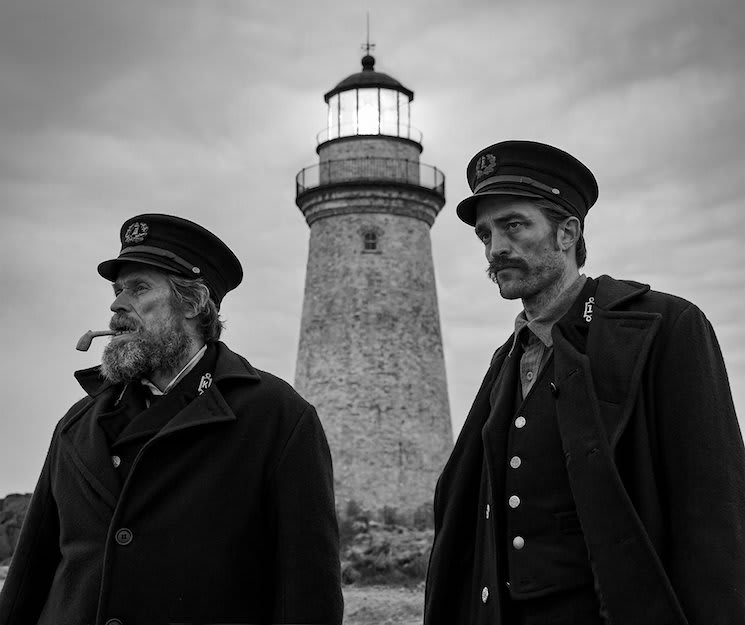Robert Eggers bounded onto the horror scene with his 2016 directorial debut, The Witch, and furthers his fascination with the depravity of humans with his followup feature, The Lighthouse. With few frills and minimal elements, Eggers stretches a simple premise to its darkest, most psychologically torturous conclusion for a full-scale, drawn-out exploration of madness.
The film takes place on a secluded lighthouse off the coast of Maine, where veteran keeper Thomas (Willem Dafoe) posts up for a month with a young apprentice, Ephraim (Robert Pattinson). While Dafoe steals the early scenes, as he alternates between being an unappeasable, cantankerous dictator and a liquored-up, joke-spewing coot, Pattinson holds strong as an initially uptight foil. Though Pattinson's old-timey Mainer accent is a bit more put-on than Dafoe's, both performances are strong and serious, as they contend with their scant surroundings. Both actors are in fine form as they thoroughly explore the dynamic between their two characters in a series of varied, delicately portrayed power exchanges.
With Eggers' slow-burning pacing and little more than murky light peeking through the intentionally grainy, stark black-and-white film, The Lighthouse sets up a series of small conflicts before slowly, subtly ramping them up before an utterly chaotic finish. The plot is deliberately bare, instead being propelled — again, very slowly — by the eventual degradations in the characters' sanities as their stay in the lighthouse continues onward.
As mirrored by the film's spare style, there's nowhere to hide, a psychological dead-end that Eggers dissects in all its revelatory glory. The idea of something as being inescapable — both one's past and present — is enough to guide The Lighthouse into the hearts of its viewers, a strong hook onto which the film anchors its emotional explorations.
Taking stylistic cues from the handbook of Guy Maddin, Eggers uses the stylistic limitations of the black and white 35mm film stock and Academy ratio, which push forward the laid-bare themes of the film. It doesn't take much to evoke the ominous ambiance that Eggers is becoming known for. While Eggers' tribute to classic psychological horror doesn't add anything new to the canon, its strong performances and fascinating meditations on the degradation of morality lead to a compelling product.
(VVS Films)The film takes place on a secluded lighthouse off the coast of Maine, where veteran keeper Thomas (Willem Dafoe) posts up for a month with a young apprentice, Ephraim (Robert Pattinson). While Dafoe steals the early scenes, as he alternates between being an unappeasable, cantankerous dictator and a liquored-up, joke-spewing coot, Pattinson holds strong as an initially uptight foil. Though Pattinson's old-timey Mainer accent is a bit more put-on than Dafoe's, both performances are strong and serious, as they contend with their scant surroundings. Both actors are in fine form as they thoroughly explore the dynamic between their two characters in a series of varied, delicately portrayed power exchanges.
With Eggers' slow-burning pacing and little more than murky light peeking through the intentionally grainy, stark black-and-white film, The Lighthouse sets up a series of small conflicts before slowly, subtly ramping them up before an utterly chaotic finish. The plot is deliberately bare, instead being propelled — again, very slowly — by the eventual degradations in the characters' sanities as their stay in the lighthouse continues onward.
As mirrored by the film's spare style, there's nowhere to hide, a psychological dead-end that Eggers dissects in all its revelatory glory. The idea of something as being inescapable — both one's past and present — is enough to guide The Lighthouse into the hearts of its viewers, a strong hook onto which the film anchors its emotional explorations.
Taking stylistic cues from the handbook of Guy Maddin, Eggers uses the stylistic limitations of the black and white 35mm film stock and Academy ratio, which push forward the laid-bare themes of the film. It doesn't take much to evoke the ominous ambiance that Eggers is becoming known for. While Eggers' tribute to classic psychological horror doesn't add anything new to the canon, its strong performances and fascinating meditations on the degradation of morality lead to a compelling product.




